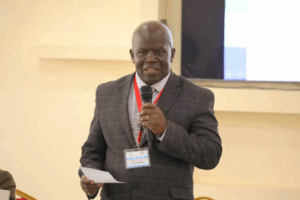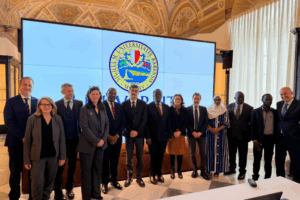
MMUST and Merck Global-Germany Roll Out Capacity-Building Training in Malaria Microscopy for Medical Laboratory Technologists
Masinde Muliro University of Science and Technology (MMUST), in partnership with Merck Global-Germany, is conducting capacity-building in Malaria Microscopy aimed at strengthening diagnostic capacity in Western Kenya. The initiative, led by Principal Investigator Mr. James Wakungwi Sakwa, seeks to enhance the skills of over thirty (30) Medical Laboratory Technologists drawn from Siaya, Kakamega, Bungoma, Nyamira, Busia, Homabay and Vihiga Counties. These are Counties located within the Lake Victoria malaria-endemic region.
The training, which began on 16th September 2025 at Golf Hotel- Kakamega, will go on up to 18th September 2025. It focuses on standardized malaria microscopy techniques, combining theory with practical sessions to ensure a consistent and high-quality malaria diagnosis. This collaboration project is centered around the implementation of a malaria microscopy education program in Kenya, designed to equip frontline laboratory professionals with advanced skills for accurate malaria diagnostics.

The Ag. Deputy Vice Chancellor (Planning, Research and Innovation)- Prof. Peter Bukhala gives his remarks at the event.
Speaking during the opening session of the workshop, the Ag. Deputy Vice Chancellor (Planning, Research and Innovation)- Prof. Peter Bukhala emphasized the program’s transformative potential in advancing skills for accurate malaria diagnostics.
“We need to strengthen preventive care and reduce the malaria burden at the community level. As beneficiaries of this specialized training, I urge you to be ambassadors of best practices in your respective Counties. We must also take this Training of Trainers (ToT) initiative to another level, ensuring that the knowledge cascades widely for maximum impact,” said Prof. Bukhala.

The Registrar Administration, Dr. Eglay Tsuma addresses participants at the workshop.
Similarly, the Registrar Administration, Dr. Eglay Tsuma, commended the initiative, noting that it reflects MMUST’s strong commitment to community health capacity building. “I encourage you to take advantage of the modern facilities and expertise available here at MMUST to sharpen your skills. As Medical Laboratory Technologists, your role in accurate diagnosis and preventive strategies cannot be overstated. We are proud that MMUST is part of this initiative,” noted Dr. Tsuma.

The Principal Investigator- Mr. James R.W. Sakwa speaks about the project at a past event.
Commenting about this project, the Principal Investigator- Mr. James R.W. Sakwa, PMLS pointed out that the project is spearheaded by the Medical Laboratory Unit of Department of Medical Laboratory Science under the School of Public Health Biomedical Science and Technology. Mr. Sakwa is the Chairperson of the Board, MMUST TVET College and the Chairperson of the Public Service Board, County Government of Kakamega.
“Besides Merck Global-Germany, other partners in our project include the National malaria control program-MoH-Kenya, County Government of Kakamega and HuQAS- Nairobi. This is a value addition to the national universal health coverage since this project aims at establishing microscopy laboratories in the rural areas to aid diagnostics within the community,” remarked Mr. Wakungwi.

The Director Corporate Communications and Marketing- Dr. Lydia Anyonje stresses a point during the training workshop.
Commending the researchers behind this initiative, the Director Corporate Communications and Marketing- Dr. Lydia Anyonje hailed the efforts of the team led by Mr. Sakwa, which she said has potential to impact on diagnostics and management of malaria in the region.
“We celebrate the efforts of Mr. Sakwa and his team for their commitment to strengthening malaria diagnostics and positioning MMUST as a leader in impactful research and capacity-building. MMUST is committed to implementing the outcomes of this project which is also an effective avenue in upscaling the visibility and marketing of the University,” stated Dr. Anyonje.
The Director of Medical Services, Kakamega County- Dr. Stephen Wandei applauded the training, saying that it was a timely intervention that directly supports county-level healthcare systems. “Malaria remains a leading cause of morbidity in our region. We look forward to seeing the ripple effect of this initiative across Sub-County hospitals and health centers,” said Dr. Wandei. The Ag. Malaria Project Mr. Eliphalet Otunga was also present at the event.
Presenting on ‘Parasitological Diagnosis of Malaria Refresher Training; Artefacts, Pseudo parasites and blood elements,’ the lead facilitator, Mr. John Kabuagi emphasized the importance of distinguishing true malaria parasites from artefacts under the microscope. He noted that misinterpretation often leads to false diagnoses, which compromises treatment outcomes and contributes to the continued burden of malaria.

The facilitator, Mr. John Kabuagi makes a presentation at the workshop.
“Accuracy in microscopy is the basis of effective malaria management. Equipping technologists with the ability to differentiate between parasites, pseudo-parasites, and other blood elements, strengthens their reliability as frontline medical practitioners,” he explained.

A section of the Medical Laboratory Technologist during a practicum at MMUST lab.
This training in Malaria Microscopy blends theoretical sessions with practical demonstrations on standardized malaria microscopy techniques, guaranteeing high-quality and consistent diagnostic services. Certainly, the workshop marked a significant step in strengthening Kenya’s frontline response to malaria. The training of the Medical Technologists takes the fight against Malaria in Western Kenya into higher scale.





By Linet Owuor



